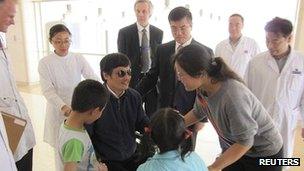China's Chen 'not pressured to leave US embassy'
- Published

Chen Guangcheng has appealed to the US president for help leaving China
Chinese dissident Chen Guangcheng was not put under pressure to leave the US embassy in Beijing, US officials say.
But Mr Chen told the BBC from his hospital bed that he now wants to leave China as he believes a deal between the US and China has been broken.
US envoy Gary Locke said Mr Chen had appeared "eager" to leave the embassy, but the activist says he has since been made aware of threats to his family.
The issue continues to overshadow two-day US-China talks.
US Secretary of State Hillary Clinton had long been scheduled to attend talks focusing on North Korea and Syria.
As talks opened, Mrs Clinton did not mention Mr Chen by name but addressed the topic of human rights.
'Disappointed with US'
In a telephone conversation, Mr Chen told the BBC that he had been unable to meet any representative from the US embassy on Thursday and that he believes they are being prevented from seeing him.
Earlier Mr Chen appealed to US President Barack Obama to help him in an interview with CNN, external,
"I would like to say to President Obama - please do everything you can to get our family out," he said.
The activist said he was disappointed with the US government.
"The embassy kept lobbying me to leave and promised to have people stay with me in the hospital. But this afternoon as soon as I checked into the hospital room, I noticed they were all gone."
Yuan Weijing, Mr Chen's wife, echoed his appeals for help, describing the situation as "very dangerous". "If they ever get us back home, they would put us in an iron cage," she said.
But Ambassador Locke, speaking on Thursday morning in Beijing, rejected the idea that pressure had been put on Mr Chen to leave the US embassy.
"I can tell you unequivocally that he was never pressured to leave. He was excited and eager about leaving," he said.
State department spokesman Mark Toner earlier also defended the embassy's treatment of Mr Chen.
"At no time did any US official speak to Chen about physical or legal threats to his wife and children, and nor did any Chinese officials make any threats to us or through us," he said.
Unidentified US sources quoted in several media reports on Thursday said American officials were in touch with Mr Chen and his wife to clarify his wishes.
A Chinese foreign ministry spokesman said he had "no information" on Mr Chen's request to leave China.
'Universal rights'
Both Hillary Clinton and US Treasury Secretary Timothy Geithner are attending the annual two-day talks, which had been expected to focus on North Korea and Syria.
Mrs Clinton has previously expressed her support for Mr Chen, who has been held under house arrest for almost two years.
As the talks opened, she addressed the topic of human rights.
"The United States believes that no state can legitimately deny the universal rights that belong to every human being - or punish those who exercise them," the top US diplomat said.
"A China that protects the rights of all its citizens will be a stronger, more prosperous partner for the United States."
President Hu Jintao, also speaking at the start of the talks, said it was not possible for China and the US to see "eye to eye on every issue".
"We should properly manage the differences by improving mutual understanding so these differences will not undermine the larger interests of China-US relations," he said.
Chinese officials on Wednesday accused the US of interference in their domestic affairs and demanded an apology for housing Mr Chen at the embassy.
Prominent activist
Mr Chen had been at the US embassy for almost a week after escaping from house arrest in his home village in the eastern province of Shandong.
He left the embassy on Wednesday, and initial statements from his lawyer suggested the activist had been released after receiving assurances about his safety.
But Mr Chen, 40, later said he left the embassy only after he heard of threats being made to his wife and children.
Mr Chen had planned his escape from house arrest for months. On 27 April, he scaled the wall the authorities had built around his house and was then driven hundreds of miles to Beijing.
The activist spent seven years in prison or under house arrest after he exposed human rights abuses, including the way thousands of women were forced to have abortions under China's "one-child-policy".
Several people involved in Mr Chen's escape have been detained or have disappeared in recent days.
- Published2 May 2012
- Published2 May 2012
- Published19 May 2012
- Published2 May 2012
- Published27 April 2012
- Published27 April 2012
- Published31 August 2012
- Published11 November 2011